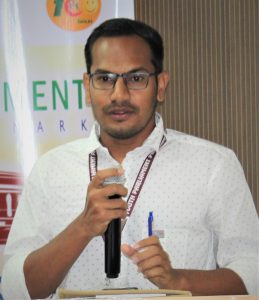About Us

The Youth Parliament Program is an initiative By Swatantrata which creates a platform for the Youth to speak up and make an impact on the change agenda for the country. To take on the policymakers and highlight the need for new thinking that will take the country forward. The Youth Parliament Program will be a debate between the best debaters and policymakers and opinion-makers. The platform will inspire the youth to express their views in an organized way. It will also allow for the emergence of bright future leaders

Vision
YPP is an ideal platform for socially conscious youth to voice their “Views & Ideas” & act as a change agent in building the India of our Dreams!!
Mission
To Create Awareness and Empower Youth through Youth parliament sessions where Youth can come together, think, discuss and debate on various issues, such as Education and Health, Electoral and Political Reforms, Judicial & Police Reforms, Local Governments & citizen-centered governance, Governance Reforms, Instruments of Accountability, Public Policy Reforms in India.
The session will include a discussion on the proposed bill, general opinion & Suggestions from the members and then pass of a resolution with necessary changes. It will surely be an engaging & enriching session & worth your time!! Your presence will surely add value to the program; will be looking forward to the event!!
- Lay a bridge between youth/like-minded people working for society/who are socially conscious and government by providing a common platform and fostering a healthy discussion on political reforms, parliamentary activities, policymaking, education, and employment.
- Empower youth and thus, capitalize on the opportunity “Demographic dividend” to the fullest.
- Act as a catalyst in building “leaders for better India”.
Knowledge Partners

Foundation for Democratic Reforms
Foundation for Democratic Reforms (FDR) is India’s leading think-tank and scientific research-resource center for studying, formulating and promoting fundamental reforms in political, electoral and governance spheres and in critical areas of state policy. It was established in 1996 and is based in Hyderabad



Centre for Civil Society
CCS envisions a world where each individual leads a life of choice in personal, economic and political spheres and every institution is accountable. India’s leading liberal think tank, ranked 5th in India and 83rd in the world by the annual study conducted by 2021 Global Go To Think Tank Index Report released by the University of Pennsylvania.

Focus Areas
Education, Health, Agriculture, Political, Electoral, Public Policy, Decentralization, Judicial, Reforms
Research, Analysis and Advocacy
Research and analysis of the functioning of democratic and constitutional institutions in India towards formulating and promoting political and governance reforms. This includes scientific study and analysis of electoral, administrative, judicial reforms and related best practices and systems from across the world.
Citizenship Training and Capacity Building
Regular training imparted to public-spirited citizens on various topics of democratic principles and processes, genuine empowerment of local governments, instruments of transparency and accountability, judicial and police reforms, opportunities for growth among youth, education and employment.

Education
India has around 29.5 percent of its population between the age group of 0-14 years. Currently, India stands at 73rd position among 74 countries in the world (PISA survey), when she is assessed in terms of skills exhibited by children in the areas of mathematics, reading and science. Further, in spite of making strides in achieving near-universal enrolments, increasing drop-out rates still remains a pressing issue. Together with the primary and secondary education sector, India’s higher education sector has also failed to map the future demand for various skills and has not kept pace with industry’s growth. Read more…

Agriculture
The Governments – Union and State – have put farmers in fetters with their antediluvian farm sector policies. A corrupt, thoughtless license-permit-quota raj has been crippling the farm sector. In agriculture, the production itself is dependent on weather gods, pests and diseases, availability of quality inputs and timely workforce. One out of three crops is lost and the farmer suffers heavy losses. But thanks to Government policies, even when a farmer raises a good crop overcoming all obstacles, the price is depressed. The farmer loses all when the crops fail, and he loses heavily when there is a good harvest. Read more…

Healthcare
Health is a non-negotiable goal. It is vital for the progress and wellbeing of any country. For India to sustain and enhance its current growth and development it must have a robust universal healthcare system in place. The current system is glaringly deficient in many areas. To begin with, public expenditure on health is a meagre 1.3% of our GDP. The draft National Health Policy rightly points out the need for an increase in public health expenditure to about 2.5% of GDP. Other emerging economies such as China, Brazil, South Africa, etc. spend around 3 to 5% on public healthcare. Read more…

Good Governance
Corruption has become a defining feature of both the administrative and the political apparatus in the state. Distribution of liquor and vote buying has resulted in the spiralling of election expenditure. To recoup the money spent during elections, elected representatives have institutionalized corruption in contracts, tenders, transfers, postings and land grabbing. Lokpal, Lokayukta, Local Ombudsman Right to Information Act Strengthening Anti-Corruption Laws Strengthening Anti-Corruption Institutions in India Strengthening United Nations Convention Against Corruption Read more…

Judicial Reforms
Judiciary is our most trusted and valued institution. However, the mechanisms for judicial appointments have proved to be inadequate in elevating the best and the brightest to the Bench. Also, the existing arrangements to hold erring judges to account have failed. Our legal system has become ponderous, excruciatingly slow and inefficient. Political interference has become a major obstacle in the effective functioning of police. Delays have become a defining feature of our judicial system. Government will bring about systemic reforms in policing and judiciary to ensure equal justice for all. Read more…

Local Governance
The 73rd and 74th amendments of the Constitution were enacted in 1993 with great hope and anticipation. However, while panchayats, nagarapalikas and municipalities have come into existence and elections are being held, this has not translated into effective decentralization of power. The Constitution left the issue of degree of empowerment and devolution to the state legislature. In most states, local governments continue to be weak. There is a need to examine the possibilities of Union intervention – through constitutional, fiscal and procedural steps – to empower local governments. Read more…








